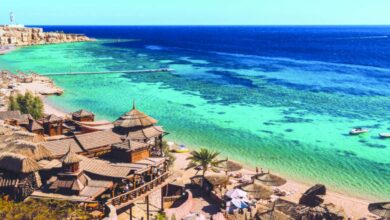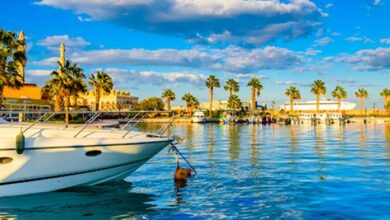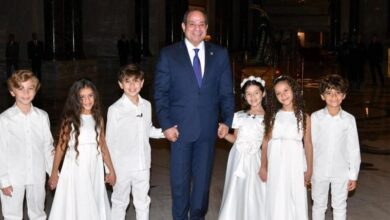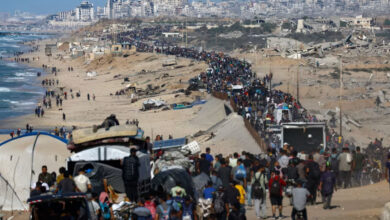Sharm el-Sheikh, Egypt’s tourism capital, breathed a sigh of relief last week when former President Hosni Mubarak was transported to Cairo, with hopes rising for a revitalization of tourism there after the city incurred millions of US dollars in losses since the start of the revolution in January.
Mubarak was hospitalized on 12 April in Sharm el-Sheikh International Hospital, when he reportedly suffered a heart attack during interrogation. He stayed there for about four months until he was transported to Cairo on the day of his trial, 3 August, and afterward was taken to a hospital in the capital, where he will remain until the end of his trial.
Salem Saleh, the head of the Tourism Authority in the city, announced on Tuesday that Sharm el-Sheikh’s hotels in August have witnessed a hike in occupancy rates of 58 percent, after dropping to just 8 percent in February.
“See how Sharm el-Sheikh’s streets look brighter now, after the ousted president left,” said Abdallah Farag, 38, with a smile on his face, as he drove his car around the South Sinai city.
Farag, who lives in the Nour neighborhood where the hospital is located and manages a supermarket in one of the resorts, explained that Mubarak’s presence was constraining and contributed to a feeling of instability in the area, which was bad for business.
“When tourists pass by the hospital and see the police barricades and the tension surrounding the place, they get worried,” said Farag, whose Italian friend canceled his trip to Sharm el-Sheikh after learning Mubarak was hospitalized there.
Farag said his market had suffered thousands of dollars in losses for four months. Nevertheless, the situation is getting better every day, he contended.
Four months of heavy security around the hospital, with tens of police and military units deployed with barricades and checkpoints, had suffocated the Nour neighborhood, where thousands of the city’s working class live.
“It was such a relief that [Mubarak] left. I pity the other place where he is staying now,” said Ahmed al-Adl, 36, who works in a local restaurant overlooking the hospital.
Restrictions were put on residents’ movement in the Nour neighborhood during the ex-president’s stay. They were frequently stopped by police officers and asked to show their identifications, said Adl, who has been struggling to provide food for his wife and two children for the past four months.
“Regardless of who he used to be, at the end of the day he is a detainee; so why do we have to suffer because of him?” wondered Farag.
Nevertheless, both Farag and Adl feel optimistic that Mubarak’s leaving will attract more tourists.
Air-Vice Marshal Gad Nasr, manager of Sharm el-Sheikh’s airport, told Al-Masry Al-Youm that the airport received 95 flights last Sunday, carrying 14,000 tourists from Europe. This is the highest number of flights since the start of the 25 January revolution, dwarfing the average of 40 flights per day in July. The number, though, dropped back again on Monday to 48 flights.
Tourism representatives, however, doubt that the hike in tourism is related to Mubarak’s leaving Sharm-el Sheikh, claiming that Mubarak’s presence didn’t have a strong effect on the drop in tourism.
“It didn’t make a difference whether he was here or not,” said Rabie Abdel Rahman, executive manager of the Travco travel company branch in Sharm el-Sheikh.
“Tourism statistics didn’t change dramatically before and after the former president left, keeping in mind the natural gradual increase in the number of bookings since March. Bookings didn’t drop in May, for example, after Mubarak came,” he said.
Abdel Rahman explained that clients have to book a long time before they actually come, so it would be unrealistic to say that the increase in August is related to Mubarak. Rather, visiting rates are more affected by the general political turmoil in the destination country.
According to the Travco representative, bookings in August climbed to 65 percent, compared to just 55 percent and 50 percent, respectively, in June and July.
“There are definitely positive impressions now after Mubarak left, as it gave a sense of stability to the country. The fact that the state is able to try an ex-dictator proves that we have a strong state able to control security, which is the most important thing for any tourist,” added Abdel Rahman.
Further, Ayman Ramadan, executive manager of Coral Bay, one of the biggest resorts in Sharm el-Sheikh, told Al-Masry Al-Youm that European tourists’ occupancy in his resort has increased by about 60 percent, compared to 15 percent in July. On the other hand, tourists from Egypt and other Arab countries actually filled up to 90 percent of the hotel in July.
Tourism, which is a main source of revenue for the Egyptian economy, was hit the hardest by the recent uprising. Revenues in 2010, estimated at US$12.5 billion, are expected to fall by 25 percent in 2011, Tourism Minister Mounir Fakhri Abdel Nour told Reuters earlier this year.
Hotels have been taking huge losses since the uprising, forcing them to cut their rates in half, which has affected all of those working in Sharm el-Sheikh whose incomes rely entirely on tourists.
“The tourism field is a very sensitive one; any kind of extraordinary happening will affect it right away. People want to spend their holidays in peace and stability,” said Viktor Jemeljanov, a representative from Tez Tour, a tourism company that caters to the Russian market. “More protests and gatherings will slow down the comeback of tourism.”
Jemeljanov added that although “nobody cared that Mubarak was in Sharm el-Sheikh,” Russians were trickling back. His company has already lost millions of dollars.
“We didn’t receive one client in the period from 12 January until 4 April,” said Jemeljanov.
Meanwhile South Sinai’s new Governor Khaled Fouda told Al-Masry Al-Youm that he plans to revitalize the industrial areas Abu Znimah and Abu Redis as a way of diversifying the local economy.
“South Sinai should not depend only on tourism from Sharm el-Sheikh, there have to be other sustainable sources of revenue,” said Fouda.
Fouda added that his primary goal is to ensure safety, as it is the most important priority for a tourist.
“’Security patrols will be more frequent and there will be no complacency with outlaws,” he said.
The new governor asserted the importance of opening a dialogue with South Sinai’s Bedouin community, in order to provide them with more job opportunities and counter potential criminal acts.




